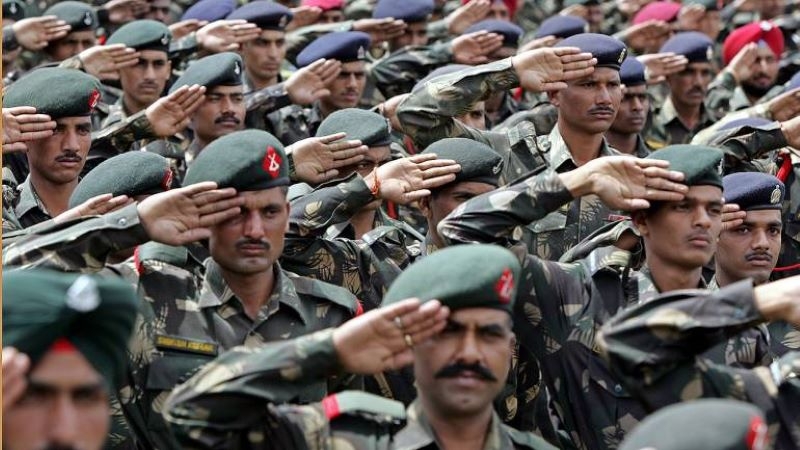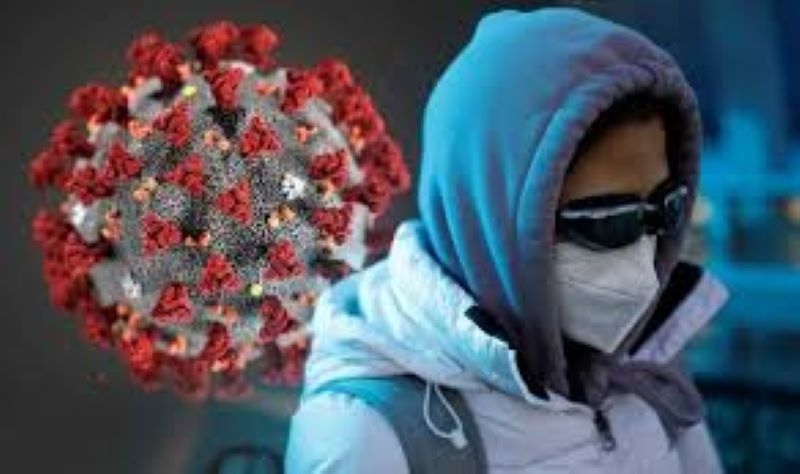Role of Indian Army In War On Corona Virus

Covid-19 or Corona Virus spreads through the suspension of a virus-containing sneeze, cough and other droplets in the air, especially if the healthy person is standing within six feet or one meter of an infected person. The virus in droplets, do not stay suspended in the humid air for a long time, and that the warmer temperatures can cause rapid degradation of the virus. It is too early to determine or even predict how this newly identified Covid-19 mutates or can be contagious in the future. As insisted by Health Officials worldwide, wash hands thoroughly, use hand sanitizers, wear N95 masks, seek medical help if you develop symptoms, avoid organizing or attending large gatherings and above all, do not believe or spread false messages.
The outbreak of the Corona Virus indicates seasonal patterns. For example, in Wuhan, China; which is the epicenter of the Covid-19 outbreak, a maximum number of cases were reported between late December 2019 and February 2020. During these months, the city experienced sub-zero minimum temperature. Similarly, Seoul, South Korea also saw a spike in confirmed cases when the minimum temperature was below zero degrees Celsius. Rome, Italy and Tehran, Iran recorded sub-zero temperatures in February.2020. The spread was engendered by the extensive traveling of infected persons, who, in turn, spread it to others, as seen in many of the recent cases reported in India.

Army has enormous capabilities in dealing with pandemics. It trains to operate in a world of bioweapons and has heavy equipment and personal protective gear necessary in an infected environment. It has a huge Medical Establishment and Bench Research Capability that can be applied to tactical treatments. Army also has logistical abilities to move manpower, equipment, and even full hospitals within days or even hours. While there will be some hesitancy from Civilian Medical Professionals to deal with the Army, they will simply have to cooperate with it for defeating biological challenges. Finally, the Army has an Ethos of Service, meaning the personnel will be willing to deliver even in the face of personal danger. That is a rich mix of abilities though disease control is not typically an area of focus for the Army.
Army has standing plans to respond to an infectious disease outbreak and it is executing those plans at its bases and operating locations. It is taking precautionary measures to protect the health of the force and maintain Operational Readiness. As with any Military Operation, Army wants to be trained, equipped and prepared to contain Covid-19 Corona Virus quickly and effectively if an outbreak were to occur in or around its bases. Units are conducting preparations in the event a soldier, family member or civilian employee is diagnosed with COVID-19. It has the capability to bring water purification, electrical generation, basic civil order, deployment of mobile surgical hospitals, airlifts of vital supplies including isolation suits, which are crucial as by now, the Covid-19 Corona Virus has evolved into a National Crisis. The army has basic contingency and operational plans to deal with pandemics; they are not frequently exercised and are chronically unfunded.
For such a crisis, the responder at Army Level would be Director General Medical Services which is ahead of the other Army Geographic Commands in terms of preparedness but will have to undertake a high-level review of readiness to respond to a large medical epidemic like Covid-19 Corona Virus outbreak. But the Army certainly can organize various public and private entities in the field. Certainly, PMO and Ministry of Health will take the lead in combating this virus but they will need help from Army in coordinating in the field with nongovernmental organizations such as the Red Cross, Doctors without Borders and the Disaster Response Corps. Private-public cooperation will be crucial in responding to Covid-19 Corona Virus pandemics, and the Army would be a perfectly placed middleman.
Indian Army is presently playing its part in containing the Covid-19 Corona Virus pandemic. It has set up a quarantine facility in Manesar, Jodhpur and Jaisalmer (Army), Gorakhpur and Hindon (IAF) and Mumbai, Kochi and Vishakhapattanam (Navy) and will be ready to operate its quarantine facility in Kolkata, Chennai, Dindigul, Bengaluru, Jhansi and Kanpur on as required basis within 72 hours of receiving the orders. The duration of these facilities will be for 30 days, extendable if required. Each Camp will have a capacity of 1200-1500 persons. Every Camp will have 15-20 Member Medical Team and Two Ambulances to send Blood Samples for investigation. Apart from this, the Army will keep 15 Medical Quick Response Reams at different locations for emergencies. Each Camp will incur an expenditure of approximately Five Lacs per day.
The army is dealing with this outbreak in Three Stages viz; Prevention within Forces, Assistance to Civil Administration and Planning for Contingencies which may arise if the threat reaches the next stage. Army has suspended Non-Essential Training and Movements till further orders; canceled all Courses and War Games, IAF is using its C 17 Transport Aircraft for the evacuation of Indian Nationals stranded abroad in Itali, Iran, and Hubei (China). It has so far evacuated 2100 people from India, Myanmar, Bangala Desh, Maldives, USA, Madagascar, and South Africa. It has canceled largest-ever Multilateral Naval Exercise, Milan, involving over 30 Countries due to this threat. Brigadier Anup Sharma of HQ Integrated Defence Staff is the Nodal Officer for Raksha Mantralaya to tackle this threat. To that end, the Army and the Nation have come together to put in possible measures required to make sure that this threat/ epidemic is contained in the best possible way and kept at the lowest level.
Army has issued guidance to its Commanders to minimize risk and ensure future readiness in the event of a further outbreak of the Covid-19 Corona Virus threat. Troops have been directed to keep their body, mind, and soul in top shape in order to protect the people from the threat of the Covid19 Corona Virus. Army has experience in coordinating complex logistic responses, which may/will be required to enforce quarantines. It will coordinate with other elements of the Government to assess potential impacts in the event of a pandemic. The military profession fosters a culture of planning. Army once called in, will be coordinating planning efforts that will be consistent in the way they are prepared. Army Engineers have been directed to be ready to build overflow hospitals and one such hospital at Barmer with 1000 bed capacity has already been handed over to Rajasthan Government. Army Engineers have been instructed to identify vacant buildings in the cantonments to convert them into hospital facilities. The army is ready, willing and able to support Civilian Authorities to the greatest extent possible But it must be understood that Army is not a cure-all and there are legal and practical limits to what it can do during Covid-19 Corona Virus crisis.
In spite of a call by the Prime Minister, many people across the country deliberately refused to remain in quarantine and came out in hordes starting from Five o’clock the same evening. This continued in day to come as they probably have not grasped the gravity of the situation. If the same continues, the Government will have no option but to call in Army to handle the situation. The army would/can contribute to this crisis by providing :
A) Field Hospitals by Army. The current civil surveillance system, however good it is, has not been able to detect a case at Airports. A person may be in the incubation period (the time between contracting the virus and showing symptoms) when entering the country and the screening at Airports may show negative. But after a few days, he may start showing symptoms and spread the infection. Army, therefore, can be tasked to improve the capacity of the health care system to treat such sick patients by deploying Field Hospitals and constructing Care Facilities. Army has the capacity to provide this surge help that Civil Hospitals need, as it has experience in deploying “Tent Hospitals”. But these hospitals have a limitation of size and capability. Field Hospitals are designed to support Trauma Patients and Combat Casualties in the worst circumstances. They deal with patients who are otherwise young and healthy and don't suffer from underlying conditions that make them more susceptible to infectious diseases such as the Covid-19 Corona Virus. Therefore, they are not prepared for patients who will need long term intensive care and ventilators.
B) Hospital/Medical Ships of Navy. Naval Hospitals can handle large scale medical emergencies. They have fully-equipped Operating Rooms, Hospital Beds, Digital Radiological Services, Medical Laboratory, Pharmacy, Optometry Lab, CAT scan and other capabilities. It is an option to be used only along the coast. Medical Ships are not conducive to containing infectious disease outbreaks because it has Open Bay Rooms intended for Trauma and not for infectious disease environment.
C) Para Military Force Call Ups. Para Military Force plays a big role when it comes to Military Response. They could be tasked to operate Drive Through Virus Testing Facilities, Staff Emergency Operations Centers, Clean Public Spaces and Transport Health Care Personnel. Para Military Forces must remain flexible, innovative and ready to help India mitigate the impacts of Covid-19 Corona Virus.
D) Curfews. People will have to take Corona Virus more seriously or the country will have to continue its fight against the pandemic for two more months in the face of disaster If a decision is taken to impose National Curfew to limit social interaction until the outbreak is under control; Army will be utilized to enforce it with the help of Para Military Forces and Police. It would entail forcefully locking people away, imposing curfews, and even issuing passport-like documents to households allowing only one family member to go out every two days for grocery shopping and the like. But the Army will have to be given Special Powers as the active-duty military is barred from conducting domestic law enforcement. The only circumstances in which the active-duty military could be called upon to provide security would be under the Disturbed Area Act.
E) Supply of Essential Goods. The army will have to take the heaviest responsibilities in helping fight the virus outbreak in the case of Mass Scale Quarantine. The reason to let the Army take over essential supplies in the Quarantined Area will be due to possible improper operations involving different local vested interests, which could drag down the battle against Covid19 Corona Virus. It may have to take charge of purchasing and transport the daily essentials needed by millions of people under lockdown inside the cities.
Since Covid 19 Corona Virus has become a Global Threat by now, it cannot be defeated by anyone Nation-State. Therefore, Military to Military Planning, Administrative Exercises and Operations can be swiftly put in place and conducted to understand each other’s Operational Tactics, Techniques, and Procedures. There is NO Treaty Organization against pandemics, but if Corona Virus goes Global in a serious way, the World is going to need one. And it would be an operation in which the USA along with her Treaty Partners, Russia, China, India and perhaps, North Korea and Iran would want and need to work together. It is for the Government to think of different ways, the Army could be used in the crisis, along with jobs that should be left to others.


